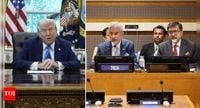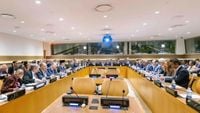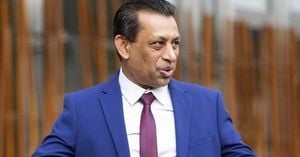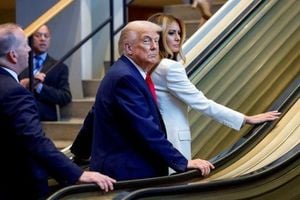On September 26, 2025, the bustling corridors of the United Nations headquarters in New York played host to a pivotal gathering: the BRICS Ministers of Foreign Affairs meeting, convened on the sidelines of the 80th United Nations General Assembly (UNGA80). With India’s External Affairs Minister S. Jaishankar at the helm, the session marked a defining moment for the influential bloc—comprising Brazil, Russia, India, China, and South Africa, alongside new members Egypt, Ethiopia, Indonesia, Iran, and the United Arab Emirates—as it charted a course for expanding its role in global governance and amplifying the voice of the Global South.
India’s upcoming BRICS Chairship in 2026 took center stage, as Jaishankar received unanimous support from his counterparts to host the annual summit and guide the group’s agenda for the coming year. According to the joint statement released after the meeting and reported by ANI, the ministers “expressed appreciation to India for holding the BRICS Ministers of Foreign Affairs/International Relations meeting on the margins of UNGA 80” and “extended their full support to India for its BRICS Chairship in 2026 and the holding of the XVIII BRICS Summit in India.”
Jaishankar, posting on X (formerly Twitter), highlighted the priorities for his tenure: food and energy security, digital transformation, and, crucially, reforms to the United Nations—particularly the Security Council. The meeting’s agenda reflected these priorities, with the ministers reiterating their support for the 2023 Johannesburg-II Leaders’ Declaration, which advocates a comprehensive overhaul of the Security Council to make it “more democratic, representative, effective, and efficient.” The statement, cited by The Tribune, made explicit the bloc’s backing for “the aspirations of Brazil and India to play a greater role in the United Nations, including its Security Council,” a nod to the longstanding ambitions of both countries to secure permanent seats at the table.
Beyond institutional reform, the BRICS meeting took an unflinching stance against terrorism. The joint statement condemned “in the strongest terms the terrorist attack in Jammu and Kashmir on April 22, 2025, during which 26 people were killed and many more were injured.” The ministers reaffirmed their commitment to combating terrorism in all its forms—including cross-border movement, financing, and the provision of safe havens—urging zero tolerance and rejecting double standards. This pointed condemnation echoed India’s recent rebuttal to Pakistan Prime Minister Shehbaz Sharif’s remarks at the UNGA, in which India slammed what it called “absurd theatrics” and the glorification of terrorism.
The meeting also addressed the simmering tensions in the Middle East, with ministers condemning air strikes on Iran since June 13, 2025, and an attack on Qatar, reportedly carried out by the US and Israel. The statement, as reported by The Tribune, called these actions “violations of international law and the charter of the United Nations,” expressing grave concern over the escalation of security risks in the region. The BRICS also voiced “serious concern” over deliberate attacks on Iran’s civilian infrastructure and peaceful nuclear facilities, underscoring the bloc’s commitment to upholding international law and the UN Charter.
Economic issues loomed large over the proceedings, with the ministers issuing a sharp critique of the United States’ recent wave of tariffs and protectionist policies. The joint statement, as highlighted by The Times of India, warned that “the proliferation of trade-restrictive actions, whether in the form of indiscriminate rising of tariffs and non-tariff measures, or protectionism, in particular measures used as a means of coercion,” threaten to “further reduce global trade, disrupt global supply chains, and introduce uncertainty into international economic and trade activities.” The statement implicitly criticized moves such as the US’s 50 percent tariffs on Indian goods linked to Russian oil imports—measures India has decried as coercive and destabilizing.
The ministers cautioned that these actions could “exacerbate existing economic disparities and affect prospects for global economic development,” and voiced “serious concerns about the rise of unilateral tariff and non-tariff measures which distort trade and are inconsistent with WTO rules.” The group reaffirmed its commitment to a “non-discriminatory, open, equitable, transparent, fair, inclusive, and rules-based multilateral trading system with the WTO at its core.” This perspective was echoed by all member states, old and new, reflecting a united front in defense of the multilateral trading system and the interests of developing economies.
The expansion of BRICS itself was another headline development. The meeting marked the first major gathering since the Johannesburg Summit in 2023, which saw the bloc’s membership swell to include Egypt, Ethiopia, Indonesia, Iran, and the UAE. The joint statement declared that “the BRICS expansion reflects its influence, credibility, and appeal as an important platform for inclusive global governance and for amplifying the collective voices from the Global South.” According to News18, Jaishankar emphasized India’s commitment to promoting peace, development, and sustainable partnerships within the BRICS framework, urging the group to work together on pressing international issues, including climate action, security cooperation, and economic growth.
The ministers also reaffirmed their commitment to enhancing the participation and representation of Emerging Markets, Developing Countries (EMDCs), and Least Developed Countries (LDCs) from Asia, Africa, Latin America, and the Caribbean in global decision-making. As reported by The Times of India, the group called for “a more just and equitable international governance system,” stressing the importance of continuity, coordination, and institutional development within BRICS to amplify the collective voice of developing nations and promote inclusive global governance.
Throughout the session, the ministers underscored their support for multilateralism, multipolarity, and the full respect of international law, including the UN Charter. The meeting’s inclusive tone and the addition of new member states signaled BRICS’s intent to consolidate and strengthen its influence, even as it faces criticism from some quarters—such as US President Donald Trump, who labeled the group “anti-US” earlier in the year. The ministers, however, were clear in their resolve to “consolidate and strengthen BRICS” in line with “membership expansion guiding principles, standards, criteria, and procedures adopted during the BRICS Johannesburg Summit in South Africa in 2023.”
As the meeting concluded, it was evident that BRICS is evolving into a more robust and representative voice for the Global South, determined to push for reforms in global governance, defend the interests of developing economies, and promote peace and stability in an increasingly multipolar world. With India poised to assume the Chairship in 2026, the stage is set for a year of heightened diplomatic activity and, potentially, transformative change within the international system.





